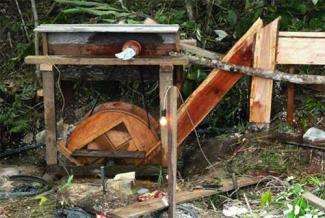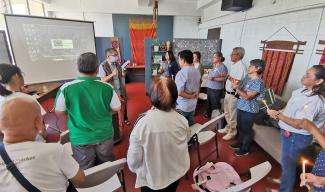A micro-hydro system based electric generator with open flume turbine propeller 125, with a capacity of 1 KW has made changes in Dusun Tekalong, West Kalimantan. 1.2 KW Generators from the brand TECO are successful in illuminating Dusun Tekalong, which is one of the 537 villages in West Kalimantan that have yet to enjoy being connected to an electricity network.
In Batang Lupar Subdistrict, there are people do not get electricity, because of its remote location that is far away from both the district and the access to the main roads. Some of the villages and dusun can only be accessed by foot.
The generator is located approximately 1000 meters north of the house of betang Tekalong, about 300 meters from the main road. To run a turbine engine a water pressure of at least 50 liters per second is needed. There are enough resources in this village to operate a micro hydro power plant throughout the year.
The people of Batang Lupar subdistrict, Kapuas Hulu regency in West Kalimantan, have the potential to develop a micro-hydro system, since the hilly and forested area has enough available water resources. The water resources of this region are very important to provide water to Sentarum Lakes National Park. This village community are the Dayak Iban who still retain local ordinances for agriculture, customs and culture. Land and forests are managed and maintained by means of local customs, so that indigenous forests are still available for the development of such power plants.
Simple small-capacity generator, built and managed by the community itself, manage to meet the electricity needs of a traditional home, called rumah betang. In addition to lighting, the electricity is also used for electronic equipment, home appliances and more since it has been equipped with voltage security devices by the ballast control system at the generator.
Yayasan Riak Bumi Kalimantan Barat, who joined the process since November 2014 until January 2015, sees how active community participation is in the conservation area of the village Tekalong Sentarum National Park. They are involved in every stage of socialization to the technical considerations that are made to match the culture of the community.
The effects of this power plant can be felt directly by the people. The power supply, used for their daily needs, also creates mutual awareness about the importance of preserving forests, as well as maintaining a continuity of electrical energy supply. In order to maintain water driving the electric turbines and micro-hydro turbines, the people must safeguard and take care of the forests of Bukit Tucung Pelawan in its entirety.
Creating independent Electricity Windmills
Developing windmill electricity becomes a learning model for rural communities. "Julantring", is a popular term for traditional electric wheel models such as the common tool used by the people in South Cianjur, West Java. The main characteristics that makes an electrical windmill such a sustainable and green technology are the eco-friendly materials and equipment used, which are made of wood and used equipment common to the community.
The generators that are becoming the main engine to generate electricity, are made from recycled materials. Those recycled materials are used dynamos of motorcycle engines reassembled into AC power generators and can generate between 100-200 watts of power. The blades of the rotor of the dynamo are made of wood and built in such a way that it can serve as a producer of energy by processing the water flows into the rotating mechanical power generators. The pulleys that create the rotating propulsion are made of old but unused bicycle wheel rims. The fan belt that connects the cog wheels are made of sliced rubber tires.
This windmill is installed 800 meters from the betang house in Dusun Tekalong. The predicted generated electric power will light 30 lamps.
Transfer knowledge between the experts and the public about the manufacturing of micro-hydro power plant facilities has another important impact. It is hoped for that the solutions used in Dusun Tekalong will become a model for other regions, so that a network of micro-hydro generator users will come to exists in the district of Kapuas Hulu, West Kalimantan.




